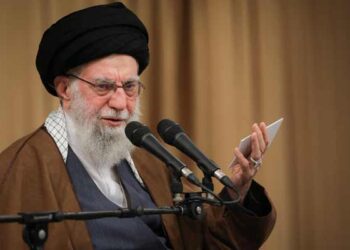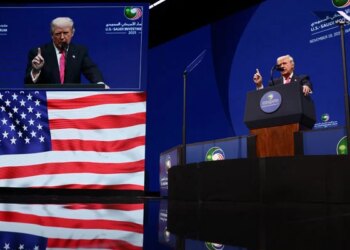Select Language:
Displaced Palestinians in Gaza, ordered southward during the conflict, are seen traveling along a road on an animal-drawn cart as they head back north amid a ceasefire between Israel and Hamas in central Gaza on October 11, 2025. — Reuters
Samra’a Luqman, a lifelong Democrat, emerged as a vocal supporter of Donald Trump in 2024, rallying the Arab American community in Dearborn, Michigan, in hopes that he could bring an end to the Gaza conflict. Now that Trump has helped mediate a ceasefire, Luqman feels a mix of excitement and vindication after facing months of criticism from neighbors upset by her support for Israel.
“It’s almost like an ‘I told you so’ moment,” said Luqman, who is Yemeni American. “No other president could have pressured Bibi to agree to the ceasefire,” she added, referring to Israeli Prime Minister Benjamin Netanyahu.
Luqman and other Arab American Trump supporters speaking to Reuters expressed cautious optimism about the recent agreement but also voiced concerns that Israel might breach the ceasefire, as it has done in Gaza and Lebanon in the past.
“We’re all holding our breath,” said Mike Hacham, a Lebanese American political consultant and Dearborn resident who campaigned vigorously for Trump in 2024. “Credit where it’s due, but this isn’t a peace deal. It’s just the end of a bloody war, and the lives lost on both sides—Israeli and Palestinian—can’t be brought back.”
Guarded Optimism About Gaza, Distrust Toward Israel
Recent Israeli airstrikes in Qatar and other Arab nations have deepened mistrust of Israel among Michigan’s Arab community, which numbers over 300,000. The agreement marks a significant step toward ending a two-year war that Palestinian health officials say has resulted in over 67,000 deaths in Gaza.
The deal includes a ceasefire and the release of the last 20 of 250 hostages taken by Hamas when the conflict began with the October 7, 2023 attacks that killed more than 1,200 people, according to Israeli authorities.
For months, Arab Americans have grown frustrated with what they see as Trump’s failure to rein in Netanyahu and bring an end to the fighting. Trump’s renewed ban on travel from several Muslim-majority nations and measures limiting speech against pro-Palestinian protests have further unsettled many, including more than a dozen Arab American voters who supported him last year.
Many also expressed disappointment that their community’s votes—crucial in Trump’s victory in Michigan—haven’t led to more prominent positions for Arab Americans and Muslims within his administration. It remains uncertain whether the ceasefire will influence skeptical voters ahead of next year’s tight congressional and gubernatorial races in Michigan, or the 2028 presidential election.
Hacham said Trump will likely be praised as a “champion of peace” for brokering the Gaza ceasefire. Still, he warned that if the agreement fails, Arab American voters might turn away from him and other Republicans.
“We’re ready to abandon the Republicans and go back to the Democrats if needed,” he said. “We’ve shown Trump that we hold the power to sway elections whichever way we choose.”
Gaza Switch Motivated by Anger Toward Democrats, Support for Trump
Trump’s 2024 victory in Michigan by over 80,000 votes—reversing his 154,000-vote loss in 2020—reflects shifting sentiment. A 2024 Arab American Institute poll indicated Trump’s support among Arab Americans nationwide at 42%, slightly edging out Kamala Harris at 41%, though down 18 points from Biden’s share in 2020.
Beyond Gaza frustrations, Trump’s campaign in 2024 also resonated with conservative voters concerned about Democratic stances on transgender rights, according to Luqman. She believes many voters might stick with Republicans for this reason, but says a sizable segment of Arab Americans backed Trump “out of spite” against Democrats. Their continued support might hinge on how events unfold in Gaza.
“Many haven’t yet found their political home with the Republicans,” Luqman said. “But Trump’s pressure on Netanyahu could strengthen support for JD Vance in upcoming elections and for other Republican candidates.”
Imam Belal Alzuhairi, who joined Trump on stage in Michigan just before the 2024 election alongside 22 other clerics, believed Trump offered the best chance for peace. However, he noted many Yemeni Americans grew disillusioned after Trump reimposed travel bans on Muslim-majority countries.
“People are upset and worried about themselves and their families. There’s distrust after the travel bans,” Alzuhairi said. After facing personal backlash for endorsing Trump, he’s stepping back from politics to focus on faith and family.
Trump’s Efforts to Ease Arab American Discontent
Richard Grenell, a Michigan native and Trump appointee leading outreach to Arab American and Muslim voters, visited Detroit last month for the first time since November to meet with community leaders. His goal was to address mounting frustrations and prevent Arab Americans from shifting back to the Democrats, as they did after Bush’s 2003 Iraq invasion.
At meetings in Dearborn, leaders including Luqman, Alzuhairi, and others discussed concerns over the travel ban and U.S. arms sales to Israel. Grenell emphasized the importance of maintaining dialogue and access.
Though he faced tough questions, he pledged ongoing engagement and reiterated Trump’s commitment to peace worldwide. “You can’t show up just before an election and expect to be a credible voice for any community,” he said.
Meanwhile, young Arab American influencer Ali Aljahmi, 20, credited Trump for visiting Dearborn twice during the campaign. While confident in Trump’s support, he remains cautious about the future.
“Trump made promises, and he showed his presence. But three years from now, we’ll see what’s really happening,” Aljahmi stated.







